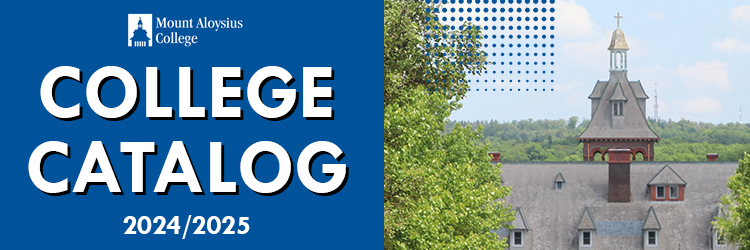2024-2025 College Catalog 2024-2025 College Catalog |
|

Excellence In The Mercy Tradition
7373 Admiral Peary Highway
Cresson, PA 16630-1999
(814) 886-4131
www.mtaloy.edu
Mount Aloysius College reserves the right to alter the programs, courses, regulations and schedule of charges defined within as necessary. Mount Aloysius College also reserves the right to terminate or renew the registration of a student for reasons that are in the best interest of the institution.
Non-Discrimination Statement
Mount Aloysius College strictly prohibits and does not tolerate unlawful discrimination against any person on the basis of age, ancestry, color, disability or handicap, national origin, race, religious creed, gender, gender identity, sexual orientation, genetic information or veteran status in the administration of its admissions and employment practices, educational policies, financial aid, scholarship and loan programs, athletics or any other College administered program.
Any person with limited English language skills will be provided assistance upon request. Such assistance is provided by the College to ensure limited English language skills is not a barrier to admission or participation in programs of the College.
Inquiries or requests for information regarding civil rights or grievance procedures, should be directed to the Vice President for Student Affairs, the College’s designated Title IX and Section 504 Coordinator, at the Office of Student Affairs, Cosgrave Center, 7373 Admiral Peary Highway, Cresson, PA 16630. Tel: (814) 886-6472.
If you have questions or need information regarding specific accommodation(s), including physical access to campus facilities, please contact the Director of Counseling and Disability Services department, St.Joseph’s Hall, room 101, or call (814) 886-6515. Any request(s) for accommodation should be made with as much advance notice as possible in order to provide sufficient time for the College to review and respond to your request in a timely manner. All requests should be submitted at least 30 days prior to an effective date of implementation.
The College expressly reserves the right to increase, decrease, withdraw, cancel, reschedule, repeal, change, modify or amend any provisions, policies, requirements, rules, charges, fees, expenses, courses, programs of study, degrees, and other academic regulations. Mount Aloysius College further reserves the right to dismiss a student from the College for cause at any time. It also reserves the right to impose probation, suspension or other disciplinary action on any student whose conduct or achievement is unsatisfactory. When a student is dismissed or suspended for cause, there will be no refund of tuition or fees paid. Neither will there be any refunds in the event the operation of Mount Aloysius College is temporarily suspended as a result of any act of God, strike, work stoppage, disruption, or any other reason beyond its control. Other refund policies are stated elsewhere in this catalog.
|
Stay Connected!